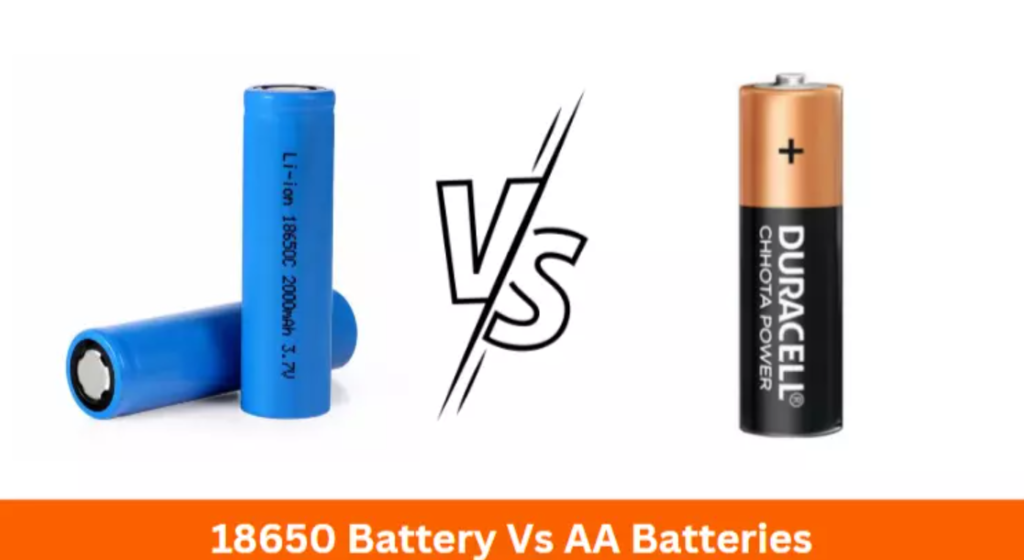In the ever-evolving world of technology, the importance of batteries cannot be overstated. They are indispensable components of countless devices, from smartphones to remote controls. Among the many types of batteries available, the 18650 and AA batteries have become particularly popular. Both batteries offer unique advantages and disadvantages, making them suitable for various devices and applications. In this article, we will conduct a thorough analysis of these two battery types, examining their features, benefits, and ideal use cases.

Distinguishing Features of 18650 and AA Batteries
Batteries are the lifeblood of electronic devices, delivering the energy required to keep them functioning. Both the 18650 and AA batteries are widely utilized across numerous industries, each offering distinct characteristics.
The 18650 battery is a rechargeable lithium-ion battery known for its high capacity and long lifespan, making it ideal for power-intensive applications. Conversely, the AA battery is a readily available alkaline battery, typically used in low-power devices.
Advantages of 18650 Batteries
18650 batteries hold several advantages over AA batteries, including:
- Higher Capacity: 18650 batteries boast greater energy storage capacity compared to AA batteries, ensuring devices have power for extended periods.
- Longer Lifespan: 18650 batteries are designed to last longer than their AA counterparts, reducing the need for frequent replacements.
- Rechargeable and Cost-effective: As rechargeable batteries, 18650 batteries provide an economical solution for devices that demand significant power for prolonged durations.
- Versatile Applications: 18650 batteries are suitable for a broad range of high-power devices, including high-intensity flashlights, e-cigarettes, and power tools.
Advantages of AA Batteries
AA batteries, in contrast, offer several benefits over 18650 batteries, including:
- Widespread Availability: AA batteries are easily accessible and can be purchased in most stores, making them a convenient option for users requiring quick battery replacements.
- Diverse Applications: AA batteries are compatible with an extensive array of devices, such as remote controls, toys, and digital cameras.
- Budget-friendly: AA batteries are an affordable option for users seeking cost-effective power solutions.
- Compact and Lightweight: AA batteries are designed with portability in mind, making them ideal for devices that need to be lightweight and easy to carry.
The 18650 and AA batteries possess unique attributes that make them suitable for different types of electronic devices.
Crucial Differences between 18650 and AA Batteries
The 18650 and AA batteries exhibit several notable distinctions, including:
- Capacity and Lifespan: 18650 batteries offer a higher capacity and longer lifespan compared to AA batteries.
- Rechargeability: 18650 batteries are rechargeable, whereas AA batteries are typically disposable.
- Size and Weight: 18650 batteries are larger and heavier than AA batteries, making them less portable.
- Cost: While 18650 batteries tend to be more expensive initially, they are more cost-effective in the long run due to their rechargeability and multiple uses.
Comparison Table: 18650 Batteries vs AA Batteries
| Feature | 18650 Batteries | AA Batteries |
|---|---|---|
| Capacity | Higher | Lower |
| Lifespan | Longer | Shorter |
| Rechargeability | Rechargeable | Disposable |
| Size | Larger, heavier | Smaller, lighter |
| Best Applications | High-power devices, rechargeable devices, compact and powerful batteries | Low-power devices, small and portable batteries, quick and easy battery replacement |
Chemistry Comparison between 18650 and AA Batteries
The primary distinction in battery chemistry between 18650 batteries and AA batteries lies in their composition. 18650 batteries are lithium-ion batteries, whereas AA batteries can either be alkaline or rechargeable nickel-metal hydride (NiMH) batteries.
Typical chemical formulas for these batteries include:
- Lithium-ion 18650 Battery:
- Cathode: LiCoO2 (Lithium Cobalt Oxide)
- Anode: Graphite (C)
- Alkaline AA Battery:
- Cathode: Zn(OH)2 (Zinc Hydroxide)
- Anode: MnO2 (Manganese Dioxide)
- Rechargeable NiMH AA Battery:
- Cathode: NiOOH (Nickel Hydroxide)
- Anode: Metal Hydride (MH)
18650 lithium-ion batteries boast a higher energy density and longer lifespan compared to alkaline AA batteries. They are more expensive but have a lower self-discharge rate, allowing them to retain a charge for longer periods.
Alkaline batteries, on the other hand, are disposable batteries with lower energy density and shorter lifespans. However, they are more widely available and less expensive than lithium-ion batteries.
Rechargeable NiMH batteries share similarities with alkaline batteries in terms of energy density and lifespan but are rechargeable and have a lower self-discharge rate.
Ideal Applications for 18650 Batteries
18650 batteries are best suited for devices requiring substantial energy for extended periods, such as high-power flashlights, e-cigarettes, and power tools. Additionally, rechargeable devices like laptop batteries and power banks can benefit from the cost-effectiveness and rechargeability of 18650 batteries. Compact and powerful devices, such as high-power drones, are also prime candidates for 18650 batteries,
Ideal Applications for AA Batteries
AA batteries are optimal for low-power devices, such as remote controls and small toys, which do not demand significant energy. They are also convenient for devices that require portable batteries or devices that necessitate quick and easy battery replacements.
Conclusion
Both 18650 and AA batteries offer unique advantages, making them suitable for various devices. When selecting the appropriate battery, it is crucial to consider the device’s power requirements, as well as your personal preferences and needs. If you need a high-capacity, rechargeable battery, the 18650 battery is an excellent choice. However, if you require a convenient and portable battery for low-power devices, the AA battery is the ideal option.
Other factors to consider when choosing between 18650 and AA batteries include the availability of battery chargers and the environmental impact of disposable batteries. For environmentally conscious users, rechargeable options like 18650 and NiMH AA batteries can reduce waste and promote sustainability.
In conclusion, understanding the key differences between 18650 and AA batteries, their chemical composition, and their optimal applications will enable users to make informed decisions when selecting the best battery type for their devices. Both battery types have unique strengths and are designed to cater to different power needs and device specifications. By carefully considering these factors, users can ensure that their devices are powered efficiently and effectively.